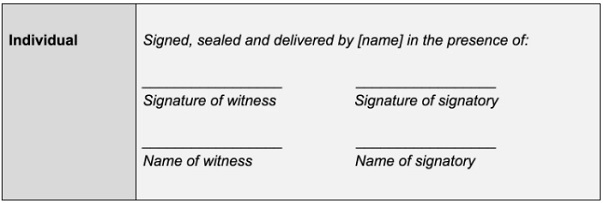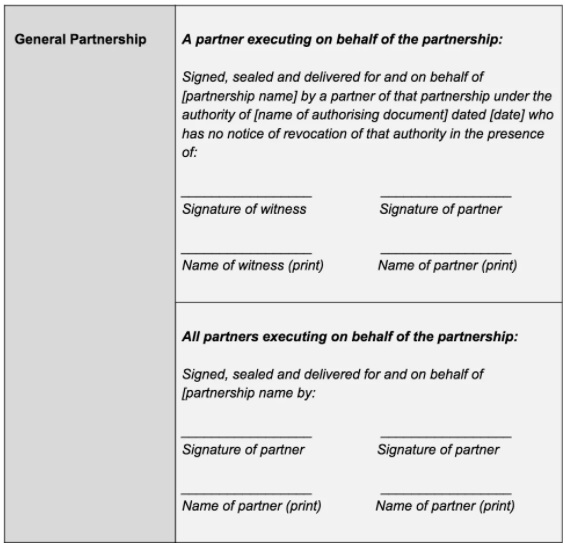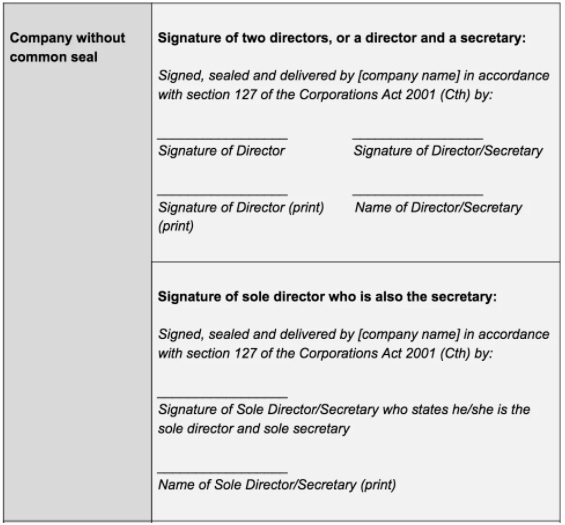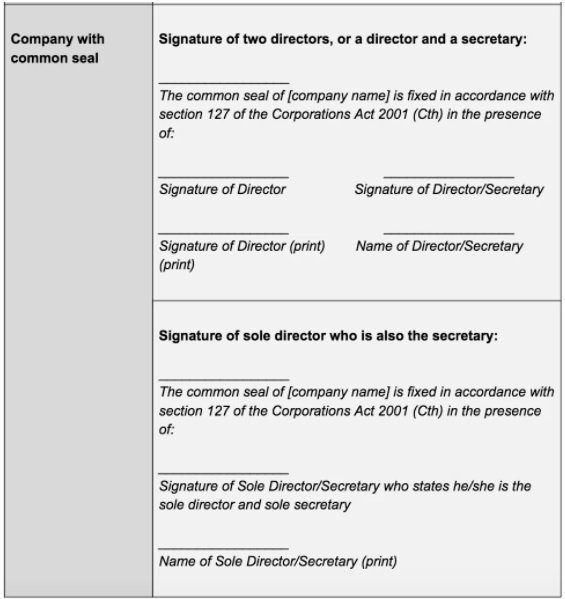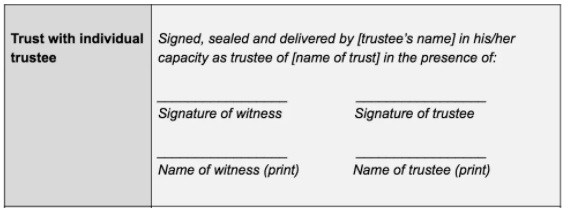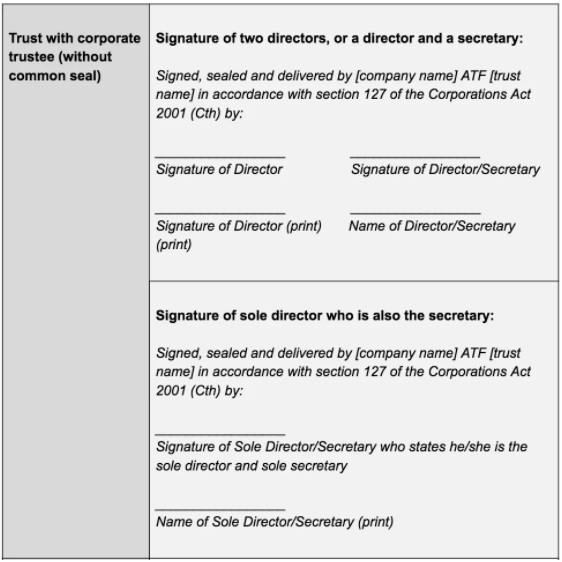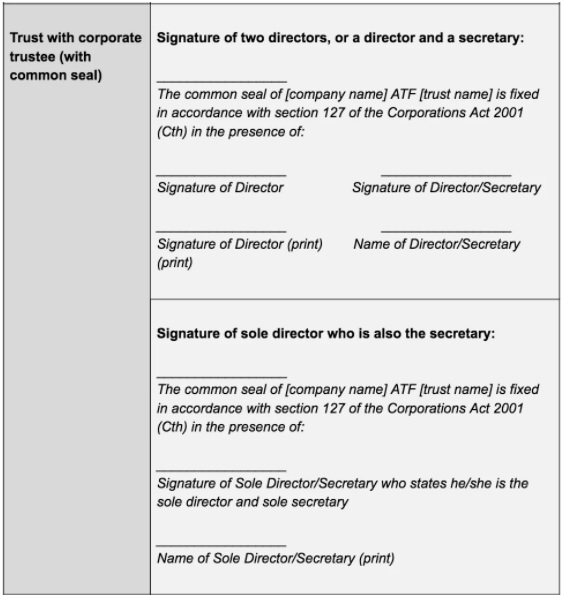- within Corporate/Commercial Law, Tax, Media, Telecoms, IT and Entertainment topic(s)
- with Senior Company Executives, HR and Finance and Tax Executives
- in European Union
- with readers working within the Law Firm and Construction & Engineering industries
The use of deeds is common in commercial transactions, so it is important to understand how to execute them correctly. There are strict requirements and if an individual, partnership or company does not follow these requirements, a court will not enforce the deed. This article will set out the process of correctly executing deeds for different business structures and arrangements.
What is a Deed?
A deed is a binding promise or commitment to do something. It is important to note that deeds are different from agreements or contracts.
At its simplest, the main difference between a deed and an agreement or contract is that a deed does not require consideration (i.e. the exchange of something valuable such as money) to be binding.
However, deeds still require:
- offer and acceptance of the terms of the arrangement; and
- the intention of the parties to be legally bound.
As deeds do not require consideration, the parties' intention to be bound by the deed will depend more on whether the parties have completed the deed correctly rather than surrounding circumstances.
Therefore, deeds have strict execution requirements, and individuals, partnerships and companies these must complete them correctly or the deed will be unenforceable.
Example: For an agreement to be legally binding at common law, the parties must exchange some form of consideration. For example, John will give Sally $40,000 if Sally gives John her car.
However, a deed does not require this consideration, which in this individual case is an exchange of money. For a deed you must simply prove there was offer and acceptance, and an intention of the parties to be legally bound. Surrounding circumstances are not relevant. For this reason, deeds have strict execution requirements.
Execution of Deeds
For a deed to be binding under general law, the deed must:
- be in writing;
- have a seal on the document; and
- be delivered to the other party to the deed.
Seal
Nowadays, execution blocks on deeds (where the parties sign the document) state that the party has "signed, sealed and delivered" the deed. As such, you do not need to have a seal physically placed on the document.
Delivery
Delivery refers to the date when a court will consider that a deed is effective. From this date, the deed will bind the parties. However, there is typically no requirement to actually deliver the deed document from one party to another. As a general rule, a court will presume that a correctly executed deed has been 'delivered' unless circumstances show otherwise.
It is also important to be aware that the execution of deeds for certain types of transactions will be subject to particular requirements under legislation. For example, in New South Wales (NSW), a deed passing an interest in real property has specific execution and witnessing requirements.
Individuals
The execution of deeds by individuals should include the individual's name and their signature.
Many states and territories have legislation which explicitly require that someone witnesses the signing of the deed. However, even if the laws of your state and territory do not require witnesses, it is still best practice to have a witness, as it serves as evidence of the actual execution of the deed as it appears.
The witness should be a third party who is not a party to the deed.
Partnerships
The main ways that partnerships can execute deeds is by:
- a partner executing the deed on behalf of the partnership where the partner has explicit authority to do so; or
- all partners executing the deed on behalf of the partnership.
With deeds, a partner must have explicit authority from a separate deed to sign on behalf of the partnership. This is different from agreements where a partner is generally presumed to have the ability in law to execute on behalf of the partnership.
This authority can be set out in a power of attorney or partnership deed.
If the above two methods are not appropriate or possible, a deed may be binding where a partner has executed the deed in the presence of all other partners.
When a partner is executing on behalf of the partnership, a third party should witness the signing, as many state and territory laws require this for the execution of deeds. Furthermore, a person witnessing the signing is recommended best practice even if it is not strictly required.
Companies
Corporations Act
The most common way for companies to execute deeds is to follow the methods set out in the Corporations Act.
The Corporations Act states that a company can execute a deed by having it signed by:
- two directors of the company;
- one director and one company secretary; or
- for proprietary companies only, the sole director who is also the company secretary.
Executing deeds in accordance with these methods is useful and reliable. This is because the Corporations Act states that if a deed is executed in these ways, the court will presume that is has been correctly executed, unless the parties knew or suspected at the time of dealings that the assumption was incorrect.
A less common method of execution of deeds is using the company's common seal. The seal is an ink stamp which the company presses onto a document, symbolising their acceptance of the agreement. The use of the common seal requires witnesses. This can be:
- two directors of the company;
- one director and one company secretary; or
- for proprietary companies only, the sole director who is also the company secretary.
Deeds require an attorney to be appointed by a separate deed. This deed must grant that person an explicit ability to execute deeds on behalf of the company.
This is different from agreements where companies may appoint agents or authorised representations by way of a board resolution to sign agreements on behalf of the company.
Trusts
Trustees execute deeds on behalf of trusts. The method of doing so will depend on whether it is an individual trustee or a corporate trustee.
The way individual trustees will execute deeds is similar to individuals. Likewise, corporate trustees will execute deeds in a similar way to companies.
The execution block should explicitly state that the signatory is executing the deed in its capacity as trustee, or "as trustee for" ('ATF') the trust.
Whenever a trust is looking to sign a deed, the trust deed should be reviewed to ensure the purported trustee has the authority to execute the deed on behalf of the trust.
Key Takeaways
For a deed to be valid and enforceable, the law requires that individuals, partnerships and companies follow certain formalities. If your business is executing a deed, make sure you understand the capacity in which the signatory is signing the document and if that person has authority enter that transaction. This is especially important if executing the deed on behalf of a business entity, where more complicated processes may apply.
[View Source]
